|
|
|
Sort Order |
|
|
|
Items / Page
|
|
|
|
|
|
|
| Srl | Item |
| 1 |
ID:
131424
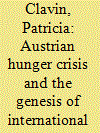

|
|
|
|
|
| Publication |
2014.
|
| Summary/Abstract |
From its foundation in 1918, the new Austrian republic was gripped by famine and a crisis of confidence in its currency that threatened to tip the new state into hyperinflation and revolution. This article shows how western efforts to aid Austria combat famine and its financial crisis were linked, and how they had a profound impact on the new League of Nations, the world's first multi-purpose intergovernmental organization. It also demonstrates the importance of the incipient wartime international bureaucracy for League agency. Contrary to the expectations of its architects, member governments, international financiers, businessmen and economists began to see the League as a useful tool to meet common needs that today would be called the search for human security. The article demonstrates how the Austrian food and financial crisis was the founding moment in the institutionalization of international economic and financial coordination, cooperation and oversight. It established the Economic and Financial Organization of the League of Nations, whose work would later inform its successors, the International Monetary Fund, the World Bank and the European Union. The study speaks to the ways in which the notion of security has broadened in the past two decades to embrace economic, social, political and environmental concerns. But the notion of 'human security' is not new; it was written into the body of the League.
|
|
|
|
|
|
|
|
|
|
|
|
|
|
|
|
| 2 |
ID:
034474
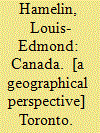

|
|
|
|
|
| Publication |
Toronto, Wiley Publishers of Canada Ltd., 1969.
|
| Description |
xv, 234p.Hbk
|
| Standard Number |
0471346802
|
|
|
|
|
|
|
|
|
|
|
|
Copies: C:1/I:0,R:0,Q:0
Circulation
| Accession# | Call# | Current Location | Status | Policy | Location |
| 012115 | 910.20971/HAM 012115 | Main | On Shelf | General | |
|
|
|
|
| 3 |
ID:
133455
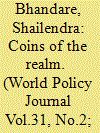

|
|
|
|
|
| Publication |
2014.
|
| Summary/Abstract |
OXFORD, England-We live in a globalized world where financial developments in one region can have an impact on a vastly different and geographically disparate location. The forces joining them are those of money, wealth, and finance, which are deeply interlinked, or so we tend to think. But the world around us has always been globalized, albeit to different degrees and involving different shades of financial undercurrents. An interesting prism to see this continual globalization is through the role itinerant and global currencies and monetary unions have played.
Money is often defined as "as any object (or record of that object) which is regularly used to make payments according to a law which guarantees its value and ensures its acceptability." Acceptance is thus at the core of any particular object being used as money. The spread of monetary traditions across regions happens because people from diverse locations accept particular monies, in the form of coins, paper, or other instruments, to make payments. The fact that coins can circulate as monetary objects greatly enhances their utility. They enable money to be spent and saved by facilitating their division.
|
|
|
|
|
|
|
|
|
|
|
|
|
|
|
|
| 4 |
ID:
132889
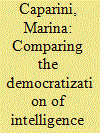

|
|
|
|
|
| Publication |
2014.
|
| Summary/Abstract |
This article discusses the reform of intelligence governance in two sub-regional groupings of former communist states: East Central Europe and the Balkans. These two sub-regions are delineated according to the pace and nature of transformations that they have undergone since the collapse of communist rule and their relations with respect to the European Union, the key political and economic organization in Europe. A number of lessons are drawn from comparing experiences in the two sub-regions relating to democratic reform of the security apparatus, and in particular the intelligence sector. Significant factors in the consolidation of democratic governance of intelligence include the nature of precursor communist-era regimes and the legacies they created, whether armed conflict has occurred during the transition, the extent and character of external (especially EU) assistance, and the strength of media and civil society. These factors appear to have influenced how transitional regimes have sought to introduce institutional reforms to constrain the powers of those services and their susceptibility to arbitrary use. They also have influenced measures taken to redress abuses by intelligence services under the preceding communist regime and the legitimation of the post-authoritarian state.
|
|
|
|
|
|
|
|
|
|
|
|
|
|
|
|
| 5 |
ID:
133899
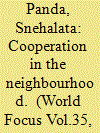

|
|
|
|
|
| Publication |
2014.
|
| Summary/Abstract |
Integration with global market economy expanded India's relationship with a wide range of countries across continents. It should be sustained and expanded along with the regional cooperation forums to strengthen economy and territorial as well as human security.(38) SAARC is the first in the series of regional cooperation organizations preceding economic reforms in India. At the moment except ASEAN and BRICS all other institutions have a lackluster performance.
|
|
|
|
|
|
|
|
|
|
|
|
|
|
|
|
| 6 |
ID:
107558
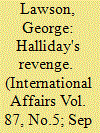

|
|
|
|
|
| Publication |
2011.
|
| Summary/Abstract |
Fred Halliday saw revolution and war as the dual motors of modern international order. However, while war occupies a prominent place in International Relations (IR), revolutions inhabit a more residual location. For Halliday, this is out of keeping with their impact-in particular, revolutions offer a systemic challenge to existing patterns of international order in their capacity to generate alternative orders founded on novel forms of political rule, economic organization and symbolic authority. In this way, dynamics of revolution and counter-revolution are closely associated with processes of international conflict, intervention and war. It may be that one of the reasons for Halliday's failure to make apparent the importance of revolutions to IR audiences was that, for all his empirical illustrations of how revolutions affected the international realm, he did not formulate a coherent theoretical schema which spoke systematically to the discipline. This article assesses Halliday's contribution to the study of revolutions, and sets out an approach which both recognizes and extends his work. By formulating ideal-typical 'anatomies of revolution', it is possible to generate insights that clarify the ways in which revolutions shape international order.
|
|
|
|
|
|
|
|
|
|
|
|
|
|
|
|
| 7 |
ID:
133458
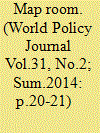

|
|
|
|
|
| Publication |
2014.
|
| Summary/Abstract |
Remittances to developing countries were a resilient source of external nancing during the recent global
financial crisis. According to the World Bank, remittances from developing countries are expected to reach $436 billion by the end of 2014. In this Map Room, World Policy Journal examines the in- ows and out- ows as a percentage of GDP in Asia. All percentages are based on World Bank and IMF 2012 data.
|
|
|
|
|
|
|
|
|
|
|
|
|
|
|
|
| 8 |
ID:
131496
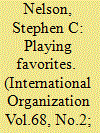

|
|
|
|
|
| Publication |
2014.
|
| Summary/Abstract |
International organizations (IOs) suffuse world politics, but the International Monetary Fund (IMF) stands out as an unusually important IO. My research suggests that IMF lending is systematically biased. Preferential treatment is largely driven by the degree of similarity between beliefs held by IMF officials and key economic policy-makers in the borrowing country. This article describes the IMF's ideational culture as "neoliberal," and assumes it to be stable during the observation window (1980-2000). The beliefs of top economic policy-makers in borrowing countries, however, vary in terms of their distance from IMF officials' beliefs. When fellow neoliberals control the top economic policy posts the distance between the means of the policy team's beliefs and the IMF narrows; consequently, IMF loans become less onerous, more generous, and less rigorously enforced. I gathered data on the number of conditions and the relative size of loans for 486 programs in the years between 1980 and 2000. I collected data on waivers, which allow countries that have missed binding conditions to continue to access funds, as an indicator for enforcement. I rely on indirect indicators, gleaned from a new data set that contains biographical details of more than 2,000 policy-makers in ninety developing countries, to construct a measure of the proportion of the top policy officials that are fellow neoliberals. The evidence from a battery of statistical tests reveals that as the proportion of neoliberals in the borrowing government increases, IMF deals get comparatively sweeter.
|
|
|
|
|
|
|
|
|
|
|
|
|
|
|
|
| 9 |
ID:
131485


|
|
|
|
|
| Publication |
2014.
|
| Summary/Abstract |
If any group of American blue-collar workers has benefited from the growth of trade it is the unionized dockworkers along the US West Coast. Nevertheless, the International Longshore and Warehouse Union (ILWU) representing these workers is vocally opposed to trade liberalization. We examine several competing explanations for this puzzle and evaluate them by tracing the union's stance on trade over several decades. We also use an original survey to compare ILWU affiliates' attitudes on trade with those of nonmembers with otherwise similar characteristics. Consistent with a model of organizational socialization, the data support the hypothesis that ILWU membership affects the members' revealed political opinions; the data are difficult to reconcile with standard theories of international trade. Our findings indicate that the political support for trade depends not just on voters' structural positions in the economy but also on the organizations and networks in which they are embedded.
|
|
|
|
|
|
|
|
|
|
|
|
|
|
|
|
| 10 |
ID:
131376
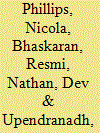

|
|
|
|
|
| Publication |
2014.
|
| Summary/Abstract |
The resilience of the problem of child labour in the global economy has been amply documented, but, we suggest, the reasons for this situation have not yet been fully captured in the associated debates. Our aim is to advance a way of thinking about those forms of child labour which occur in the context of global production networks (gpns), and to contend that greater attention must be paid to the organisation and functioning of gpns, and the social foundations on which they rest, if we are to grasp more fully the conditions and processes which facilitate the persistence and evolution of child labour. The way of thinking we propose is rooted in the concept of 'adverse incorporation' in the global economy, which we develop by drawing together currents in gpn analysis and poverty research to explore the commercial and social dynamics in gpns which give rise to these forms of labour exploitation. We illustrate our arguments with reference to the garments industry in New Delhi, India.
|
|
|
|
|
|
|
|
|
|
|
|
|
|
|
|
| 11 |
ID:
133457
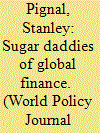

|
|
|
|
|
| Publication |
2014.
|
| Summary/Abstract |
LONDON-One of the cornerstones of Marxist-Leninist thinking is that the state should control the "commanding heights" of an economy-industry, agriculture, infrastructure, and, perhaps above all, money and banking. That vision has largely perished, with one gaping exception. Government remains omnipotent in the financial system, not only on Wall Street or Threadneedle Street, but far beyond. Across the world, the state weighs in on all sides of the ledger, insuring both a bank's assets (mortgages and loans) and its liabilities (deposits). State intervention in banking ranges from muscular day-to-day regulation through to crisis-time bailouts, and is an entirely accepted feature of the financial system. Financiers complain about excessive red tape, because that is what all businessmen do. But absent the state's involvement in their sector, it is a safe guess far fewer would still be gainfully employed following the carnage of 2008. Those who survived would likely find their ensuing careers to be nasty, brutish, short, and entirely devoid of outsized bonuses.
|
|
|
|
|
|
|
|
|
|
|
|
|
|
|
|
|
|
|
|
|